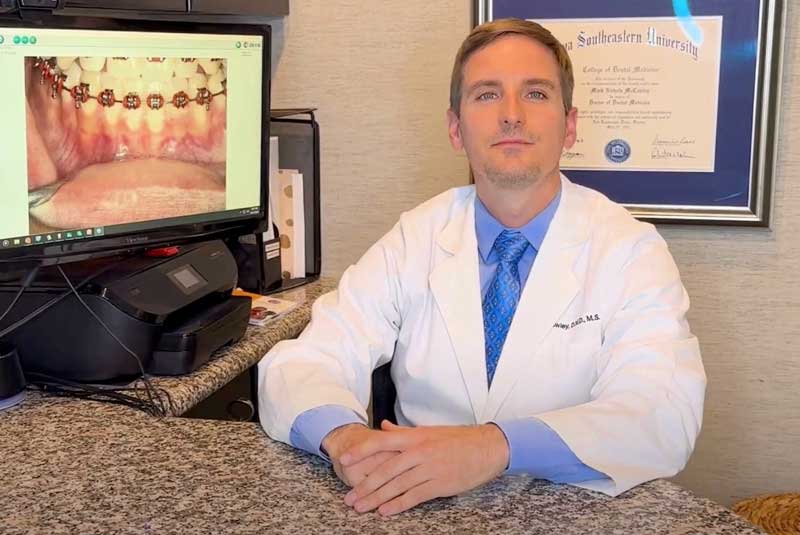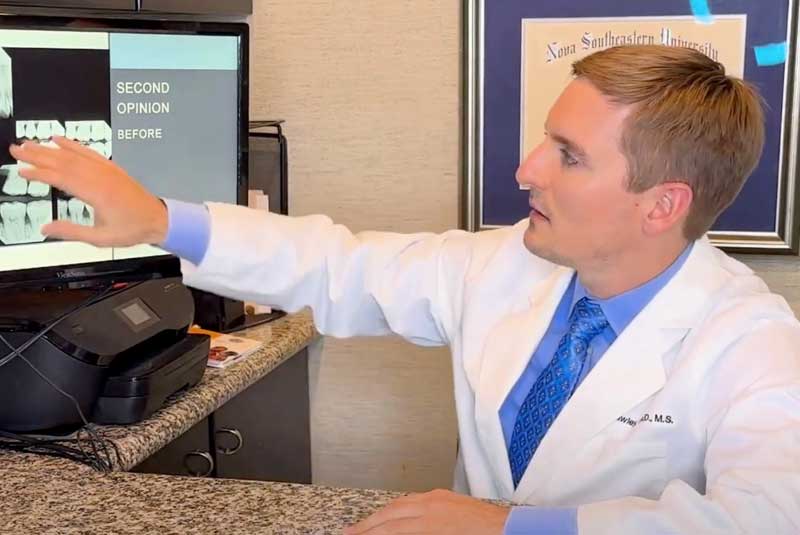| ✅ Reviewed by Dr. Tom McCawley | 🕒 Reading time: three minutes |
Dental implants are a long-term investment in your health, confidence, and quality of life. But like natural teeth, they require ongoing care to stay healthy. Without the right maintenance, implants can develop complications—especially a serious condition called peri-implantitis.
Whether you already have implants or are considering them, these five steps can help you protect your smile for the long haul.
1.Keep Up With Professional Cleanings and Check-Ups
Routine cleanings and exams are essential even with implants. While implants don’t get cavities, the gums and bone around them can still become infected. We recommend:
- Visiting your dentist or periodontist every 3 to 6 months, depending on your risk factors
- Getting regular X-rays to monitor bone levels
- Having peri-implant pockets professionally cleaned to prevent bacteria buildup
Early signs of implant trouble often go unnoticed without professional evaluation, so preventive visits are your first line of defense.
2.Use the Right Tools at Home
Caring for dental implants requires a slightly different approach than natural teeth. Standard floss or hard-bristled brushes can damage the tissues around the implant if used improperly.
For optimal home care, we recommend:
- Soft-bristled toothbrushes (manual or electric) to gently clean the implant crown
- Non-abrasive toothpaste to avoid scratching the implant surface
- Implant-safe floss or interdental brushes designed to clean around implants
- Water flossers to flush bacteria out of hard-to-reach areas
- A tongue scraper to reduce odor-causing bacteria and help maintain a healthy oral environment
Consistency matters. Brushing twice a day and flossing once daily are still the gold standard.
3.Understand the Link Between Your Health and Implant Success
Your overall health plays a major role in long-term dental implant maintenance. Certain conditions can increase your risk for peri-implantitis:
- Uncontrolled diabetes can affect healing and immune response.
- Smoking or vaping reduces blood flow to the gums and increases infection risk.
- Poor nutrition may compromise your body’s ability to maintain healthy bone.
Keeping these conditions under control not only supports your general wellness, it directly protects your implant investment.
4.Know the Early Signs of Peri-Implantitis
Peri-implantitis is an inflammatory infection that damages the bone and soft tissue around your dental implant. Like gum disease, it often starts silently. Watch for:
- Bleeding gums around the implant
- Redness or swelling
- A bad taste or odor
- Mild tenderness
- Gum recession or exposed implant threads
The earlier you spot a problem, the easier it is to treat. If you notice any of these symptoms, don’t wait—schedule a check-up.
Get Help Early If You Have Concerns
If something doesn’t feel right with your dental implant, it’s always better to act early. At McCawley Center for Laser Periodontics & Implants, we specialize in preserving dental implants and preventing further damage.
And if you’ve already been told you have peri-implantitis, there is still hope. Our practice offers the LAPIP® protocol—a gentle laser-based treatment designed to save infected implants without traditional surgery. While prevention is always the goal, our team is here to help if things go off track.
Caring for Dental Implants Is a Lifelong Partnership
Dental implants can last for decades with the right care. That starts with regular cleanings, proper at-home hygiene, and staying aware of changes in your gum health. With a few simple steps, you can avoid peri-implantitis and protect your investment.
If you have been told your implant will have to be removed because of infection or bone loss, we can help. To book an appointment at our periodontal office in Fort Lauderdale, FL, call (954) 807-4829 or visit us at 800 East Broward Blvd #706 Fort Lauderdale, FL.
FAQs
Peri-implantitis is typically caused by bacterial plaque buildup around the implant. Risk factors include poor oral hygiene, smoking, a history of gum disease, and uncontrolled health conditions like diabetes.
Peri-implantitis doesn’t go away on its own, but early intervention can stop it from getting worse. If caught before significant bone loss occurs, professional cleanings and improved at-home care may be enough to stabilize the area. In more advanced cases, we use the LAPIP® laser protocol to gently remove infected tissue, disinfect the implant surface, and stimulate healing—all without traditional surgery.
Bleeding, swelling, or tenderness around an implant can be a sign of inflammation or infection. Schedule an evaluation to catch problems early.











